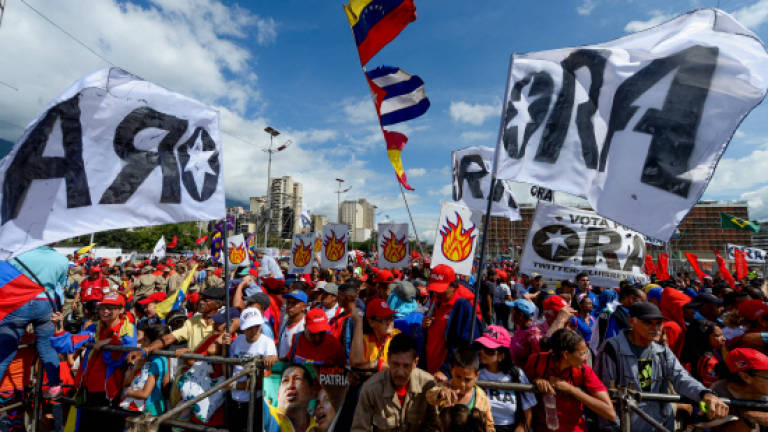Maduro delays removing currency bills amid crisis, protests

CARACAS: With protests rocking his unpopular government, embattled President Nicolas Maduro on Saturday pushed back to next month taking Venezuela's highest denomination bill out of circulation.
Maduro, who spoke after a meeting with administration officials, said he also would keep the borders with Brazil and Colombia closed until Jan 2.
"We will break the embargo they are trying to impose on us, the persecution and the sabotage," Maduro pledged.
He promised a late December announcement about when the new bills would arrive, without indicating from where they would be flown.
The president, whose popularity has plummeted, says the 100-bolivar (RM44.78) note had to be killed because "mafias" are hoarding it abroad in what he calls a US-backed plot to destabilize Venezuela.
The bill is worth about 15 US cents (67 sen) at the highest official rate, and until recently accounted for 77% of the cash in circulation in Venezuela.
Late Friday, Maduro blamed opposition politicians for the unrest, claiming that there were pictures and videos of some opposition members of the National Assembly involved in "attempts of vandalism and some acts of violence."
Maduro has presided over an unraveling of Venezuela's oil-rich economy as crude prices have plunged. He and predecessor Hugo Chavez have made the economy increasingly state-led.
Now the import-dependent country is desperately short of food, medicine and basic household goods.
Venezuela currently has the world's highest inflation rate, set to hit 475% this year, according to an IMF forecast.
The government is trying to introduce new bills in denominations up to 200 times higher than the old ones.
But the plan went off the rails when Maduro ordered the 100-bolivar note removed from circulation before the new bills arrived.
Huge wads of bills
In a country with one of the highest rates of violent crime in the world, shoppers must carry round unwieldy wads of bills to pay for their purchases.
Retirees had complained for months that their pensions were paid in unmanageable 50- and 20-bolivar denominations.
Angry protests erupted around the country as the chaotic reform left people without money to buy food or Christmas presents.
In the southern state of Bolivar, a lawmaker and councilman said that four people died in rioting there. Authorities had not yet confirmed the deaths.
A recession driven by plunging prices for Venezuela's crucial crude oil exports has led to shortages of food and medicine.
Citizens face long queues to buy basic supplies and inflation has soared. Deadly riots and looting have broken out over recent months.
Analysts have warned there is a risk of unrest in Venezuela, which Human Rights Watch says is in the grips of a "humanitarian crisis." Anti-government protests in 2014 led to clashes that left 43 people dead.
The centre-right opposition blames Maduro's management for a deep economic crisis.
Polls show that more than half of Venezuelans want the president to stand down.
But the elected leftist leader has vowed to hold onto power at least until his term ends in 2019. — AFP